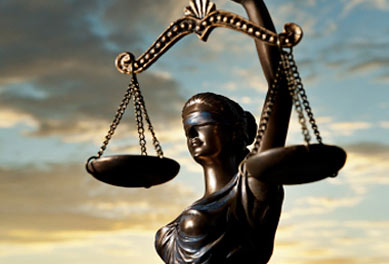Breaking Bad Law - Quotes

FROM 130 BC TO THE PRESENT, VOICES THAT ENCODE THE CRUCIAL ROLE OF CIVIL DISOBEDIENCE IN CHANGING BAD LAW AND FURTHERING SOCIAL PROGRESS.
"If we desire respect for the law, we must first make the law respectable."
– Louis Dembitz Brandeis (1856 - 1941) American lawyer and associate justice on the Supreme Court of the United States from 1916 to 1939.
"If you are neutral in situations of injustice, you have chosen the side of the oppressor."
– Bishop Desmond Tutu (1931 - ) South African social rights activist and retired Anglican bishop.
"One has a moral responsibility to disobey unjust laws."
– Martin Luther King Jr. (1929 - 1968) was an American Baptist minister, activist, humanitarian, and leader in the African-American Civil Rights Movement.
"Protest beyond the law is not a departure from democracy; it is absolutely essential to it."
– Howard Zinn (1922 - 2010) was an American historian, author, playwright, and social activist. He was a political science professor at Boston University for 24 years.
"It is not always the same thing to be a good man and a good citizen."
– Aristotle, (384 BC - 322 BC) Aristotle was a Greek philosopher and scientist.
"An individual who breaks a law that conscience tells him is unjust, and who willingly accepts the penalty of imprisonment in order to arouse the conscience of the community over its injustice, is in reality expressing the highest respect for the law."
– Martin Luther King Jr. (1929 - 1968) was an American Baptist minister, activist, humanitarian, and leader in the African-American Civil Rights Movement.
"I became convinced that noncooperation with evil is as much a moral obligation as is cooperation with good."
– Martin Luther King Jr., (1929 - 1968) was an American Baptist minister, activist, humanitarian, and leader in the African-American Civil Rights Movement.
"An unjust law is itself a species of violence. Arrest for its breach is more so. Now the law of nonviolence says that violence should be resisted not by counter-violence but by nonviolence. This I do by breaking the law and by peacefully submitting to arrest and imprisonment."
– Mahatma Gandhi (1869 - 1948) was the preeminent leader of Indian independence movement in British-ruled India.
"It was civil disobedience that won them their civil rights."
– Tariq Ali (1943 -) is an English Pakistani writer, journalist, and filmmaker.
"In such a world, the rule of law maintains things as they are. Therefore, to begin the process of change, to stop a war, to establish justice, it may be necessary to break the law, to commit acts of civil disobedience, as Southern black did, as antiwar protesters did."
– Howard Zinn (1922 - 2010) was an American historian, author, playwright, and social activist. He was a political science professor at Boston University for 24 years.
"An unjust law is itself a species of violence. Arrest for its breach is more so."
- Mahatma Gandhi (1869 - 1948) was the preeminent leader of Indian independence movement in British-ruled India.
"One has not only a legal, but a moral responsibility to obey just laws. Conversely, one has a moral responsibility to disobey unjust laws."
– Martin Luther King Jr. (1929 - 1968) was an American Baptist minister, activist, humanitarian, and leader in the African-American Civil Rights Movement.
"Nonviolent civil disobedience is a genius; no power can beat it; use it when necessary!"
– Mehmet Murat ildan (1965 - ) Turkish Doctor of Philosophy.
"Must the citizen ever for a moment, or in the least degree, resign his conscience, then? I think that we should be men first, and subjects afterward. It is not desirable to cultivate a respect for the law, so much as for the right."
– Henry David Thoreau, (1817 - 1862) was an American author, poet, philosopher, abolitionist.
"Dare to do things worthy of imprisonment if you mean to be of consequence."
– Juvenal (died 130 AD) was a Roman poet active in the late 1st and early 2nd century AD, author of the Satires.
"Never do anything against conscience even if the state demands it."
– Albert Einstein (1879 - 1955) theoretical physicist and philosopher of science. He developed the general theory of relativity.
"No radical change on the plane of history is possible without crime."
– Hermann Keyserling (1880 - 1946) German philosopher.
"When leaders act contrary to conscience, we must act contrary to leaders."
– Veterans Fast for Life http://en.wikipedia.org/wiki/Veterans_Fast_for_Life
"It is dangerous to be right in matters on which the established authorities are wrong."
– Voltaire (1694 - 1778) French Enlightenment writer, historian, and philosopher.
"If... the machine of government... is of such a nature that it requires you to be the agent of injustice to another, then, I say, break the law."
– Henry David Thoreau (1817 - 1862) American author, poet, philosopher, abolitionist.
"Each man must for himself alone decide what is right and what is wrong, which course is patriotic and which isn't. You cannot shirk this and be a man. To decide against your conviction is to be an unqualified and excusable traitor, both to yourself and to your country, let men label you as they may."
– Mark Twain (1835 - 1910) Samuel Langhorne Clemens, better known by his pen name Mark Twain, was an American author and humorist.
"Anyone who believes that all laws should always be obeyed would have made a fine slave catcher."
– John J. Miller (1954 - ) American author of "And Hope to Die".
"Disobedience [is] the rarest and most courageous of the virtues."
- George Bernard Shaw (1856 - 1950) Irish playwright and a co-founder of the London School of Economics.
"Every actual state is corrupt. Good men must not obey laws too well."
– Ralph Waldo Emerson (1803 - 1882) American essayist, lecturer, and poet.
"We should never forget that everything Adolf Hitler did in Germany was "legal" and everything the Hungarian freedom fighters did in Hungary was 'illegal.'"
– Martin Luther King, Jr., (1929 - 1968) was an American Baptist minister, activist, humanitarian, and leader in the African-American Civil Rights Movement.
"We cannot, by total reliance on law, escape the duty to judge right and wrong.... There are good laws and there are occasionally bad laws, and it conforms to the highest traditions of a free society to offer resistance to bad laws, and to disobey them."
– Alexander Bickel (1924 - 1974) American law professor and expert on the United States Constitution.
"As long as the world shall last there will be wrongs, and if no man objected and no man rebelled, those wrongs would last forever."
– Clarence Darrow (1857 - 1938) American lawyer and leading member of the American Civil Liberties Union.
"It is not what a lawyer tells me I may do; but what humanity, reason, and justice tell me I ought to do."
– Edmund Burke (1729 - 1797) Irish statesman born in Dublin; author, orator, political theorist, philosopher and MP.
"I am free, no matter what rules surround me. If I find them tolerable, I tolerate them; if I find them too obnoxious, I break them. I am free because I know that I alone am morally responsible for everything I do."
– Robert A. Heinlein (1907 - 1988) American author called the "dean of science fiction writers".
"Ordinarily, a person leaving a courtroom with a conviction behind him would wear a somber face. But I left with a smile. I knew that I was a convicted criminal, but I was proud of my crime."
– Martin Luther King Jr. (1929 - 1968) was an American Baptist minister, activist, humanitarian, and leader in the African-American Civil Rights Movement.






